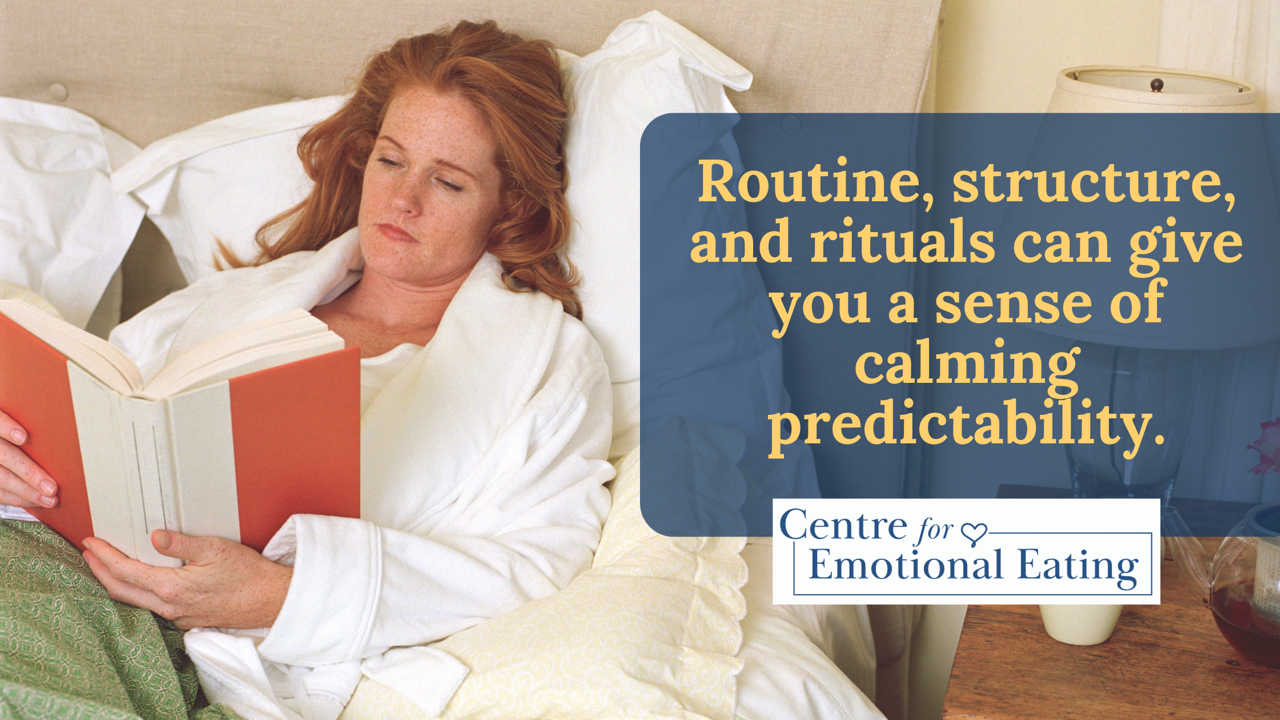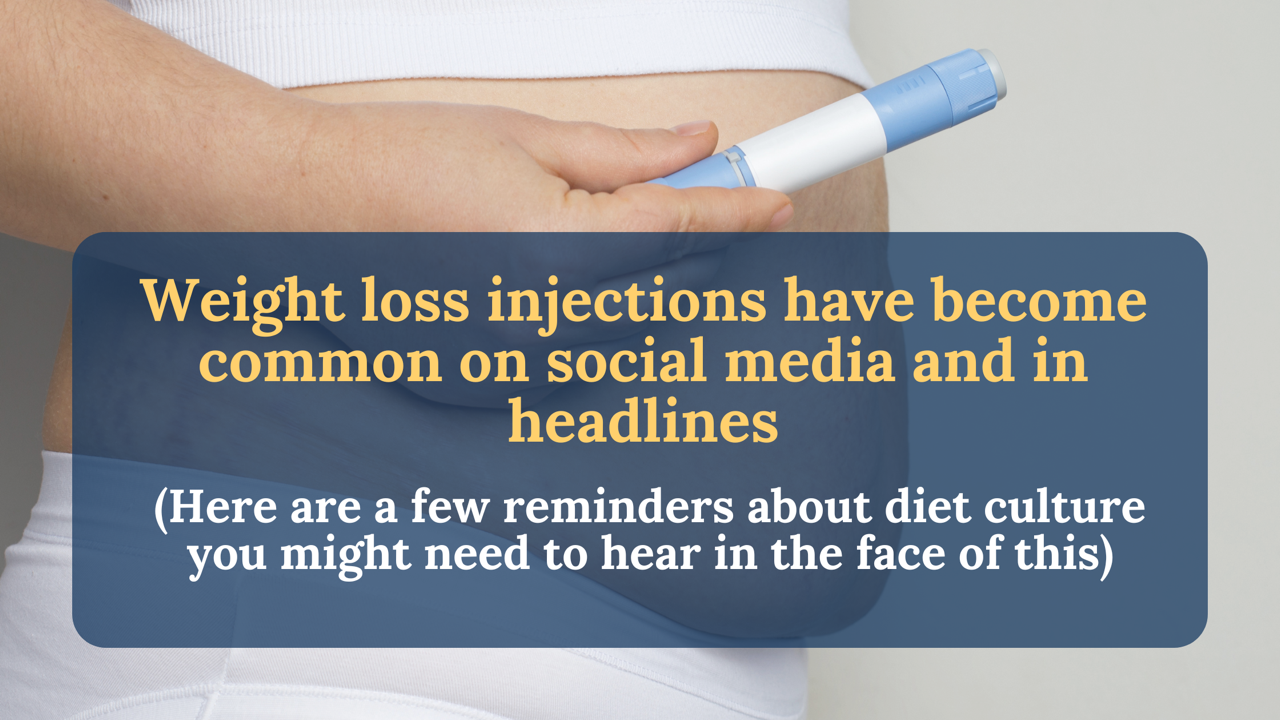BLOG
Find support not just for emotional eating, but all aspects of your well-being.
Set Goals with Self-Compassion

With the start of a new week, month, or year, it can be tempting to overhaul your life. This might look like starting a new diet, adhering to an intense exercise regime, doing a detox, or trying to white-knuckle your way to change.
How often have you tried this approach?
It isn’t a bad thing to want to change your habits, but how often does your motivation start out from a place of criticism or feeling not good enough? You can’t hate yourself towards change. Instead, coming from a place of compassion is a great way to soothe and support yourself!
Consider The Words You Use
When coming from a place of compassion, you don’t tear yourself down by picking apart your body or criticizing your abilities. This inner critic can be really mean! You can start by asking these two helpful questions when this inner voice gets loud. The next step is to start changing the words you use to talk about yourself. It doesn’t have to be fake or super positive, you can aim for neutral comments like “I am...
Create A Routine That Brings You Peace

Routines don’t have to be boring! One of the best ways to create certainty and predictability in your life is to have routines, structure, and rituals. These can be big or little things: taking the same route to work or buying the same shampoo so you’ll know how it will smell. It can be having Taco Tuesday’s or reading 30 minutes before you turn the light off for sleep.
Here are three key ways routines can support you:
Helps support your sleep. This is probably one you’ve heard of, but a good routine or ritual before bed can help you get a better night’s sleep because it keeps your body on the same wake-and-sleep ‘clock’. Try lowering the lights (even lighting a candle), putting your phone on silent, or watching your favourite comfort show.
Creates a sense of safety and reduces stress. The predictability of knowing what comes next is a great way to calm your nervous system. Consider the times you worry or are anxious about a situation, chances are you can’t predict how it will turn ...
Five Effective Ways to Ground Yourself

There are many benefits to being able to bring a sense of grounding into your day-to-day life! You don’t have to be someone who has high levels of anxiety (although the strategies below can be helpful), grounding can also make you feel more present, grateful, and connected.
Emotional eaters use food as a way to escape their body, to avoid experiencing certain feelings, either as distraction or numbing. Learning how to ground yourself can help lessen the intensity of these emotions that lead you to use food to cope and even help you emotionally eat less frequently. Try one or all of the strategies below and see what works for you!
Deep breathing. This can be as simple as taking slower, deeper breaths at your own pace or finding a patterned technique that works for you. This is such a great strategy that you can use in a meeting at work, around the dinner table, or just before bed.
Be in nature. Take off your shoes and feel the earth beneath your feet, turn your face to the warm rays ...
Client Insight: “I shifted how I thought about working out and it changed my relationship with my body.”

As an emotional eater you might feel constantly at war with your body. Trying to ignore cravings, stuff down feelings, and constantly critiquing your body. You might even feel betrayed by your body every time the scale goes up or your pants feel tighter.
A lot of this conflict comes from diet culture which encourages us to follow its rules instead of our own needs and wants. One of the most common rules, that you’ve probably engaged in, is the idea that movement is a means to an end to burn the greatest number of calories. If you’ve ever slogged through a workout or pushed past pain to hit a calorie target, chances are you have a not great relationship with movement.
But there are so many reasons to move your body that have nothing to do with your appearance! Read on to start reframing how you move your body and create more appreciation for all it does for you every day!
Forget Calories, Find Play
If you weren’t focused on how many calories you were burning, what movement would you...
Why You Dread Being Bored

Our modern society keeps us hustling: from work to parenting to errands to all kinds of activities. We’re taught that there is value in keeping busy, that being productive should be celebrated. We also are constantly bombarded online with content that highlights people having it all together, going on their next vacation, workout out at 5:00 a.m., or getting a promotion. You feel you have to keep doing to keep up!
And being busy can be a coping mechanism too.
There are a number of reasons you might keep adding to your to do list. First, keeping your mind constantly focused on what you have to do next stops you from having any space to think. It becomes an avoidance tactic that keeps you from feeling or thinking about what you don’t want to. Ever notice when the chaos of the day ends—driving home from work or after the kids are in bed—you end up reaching for food? That’s because constantly being busy is an avoidance tactic just like emotional eating. You can rely on food when your day...
Reparenting: Learning to Support the Younger You

Often here at the Centre for Emotional Eating we talk about how your patterns and habits with food are influenced not by the cravings themselves, but the root cause behind what makes you act.
For many, the root cause can be found in childhood or adolescent experiences. This is because as our brains and bodies grow, we are learning and are influenced by examples displayed around us—to finish what’s on our plate, diet talk, stuffing down emotions, just to name a few. We learn from parents, caregivers, teachers, coaches, siblings, and friendship circles! But not all of these lessons will serve you as you grow into your own adulthood, some might be downright painful or destructive.
It is incredibly common to reach a point in your adult life and know things need to change but not know how. This is where therapy can be a very helpful tool in helping you sort through your thoughts and feelings, gain confidence to make your own decisions, and help you feel more resilient.
And one effective ...
Emotional Eating Toolkit: Creating a Comfort Box

We all have bad days (heck, even weeks!) where we feel drained, angry, or even upset most of the time. If this comes up for you, it is time to create a comfort box. This can be a great resource to build yourself back up when you’re feeling low.
Here’s how to do it:
The next time you’re feeling in a good place, put together a physical box or digital list that has things that bring you comfort when your mood is low. You can include:
- A playlist or movie that lifts you up (or helps you cry). This could be either to pump up your energy or create an emotional release. It can sometimes be difficult to allow ourselves to cry when we’ve been holding it together for so long; we often judge ourselves less when we’re crying over a fictional character.
- A candle you’ve always wanted to burn or a face mask you’re wanted to try. Often, we keep certain things for a “special occasion”, but why wait! Being able to indulge in little luxuries might just give you the small boost you’re looking for (in ...
Let’s Talk About It: The Rising Popularity of GLP-1 Drugs

It seems impossible to ignore the presence of GLP-1 medications, you might have heard them being called Ozempic or Wegovy. Diet culture seems to have evolved from a focus on willpower to injections that can give you the “body of your dreams.”
It can be especially difficult to see celebrities who were previously promoting body positivity and self-love admit to taking weight loss injections. It can feel like a betrayal. And some, like influencers on social media, aren’t being transparent about their use of the drug but continue to say only diet and exercise are responsible for their results.
Plus, all these headlines, photos, and videos can make you hyper-aware of your own body as we’re encouraged to compare ourselves to others. You might find your emotional eating—reminder, that can include restricting too—ramps up the more you’re faced with this kind of content. It can be a constant reminder that weight loss is celebrated and only one body type is “acceptable.”
Here are some loving ...
Welcome Spring with these Insightful Journal Prompts

There is no denying that springtime is a season of renewed positive feelings, like hope and joy. More daylight hours, warmer sunshine, and the ability to crack the windows refreshes us. There is something about shedding puffy winter coats and clunky boots that also allows us to feel lighter—in all the senses of the word!
If you are someone who feels as if they are waking up at this time of year and aren’t sure where to put your rising energy and good mood, below we’ve got some great questions for you to reflect on!
Choose one—or play around with all of them—and get inspired to look inwards. Getting clarity can help you feel more in-tune with what fills your cup and is a great way to not only recognize your needs, but meet them. This practice makes you feel more fulfilled, meaning you’re less likely to reach for food to soothe yourself.
- If your mood is feeling more positive this season, what is it that is creating this mental shift? How can you do or get more of it? What else in yo ...
Eating for the Season

Winter can be a challenging time for many people. Less sunlight, colder temperatures, and unpredictable weather can make it difficult to keep your mood up. One of the ways you may be looking for comfort is through food, and that is normal! People often think that emotional eating is automatically bad or negative, but the truth is it is a coping mechanism just like scrolling on your phone or journaling. With awareness you can begin to understand why you reach for certain foods when you feel a certain way.
And it is usual for your cravings to change with the seasons! Cooler temperatures can have us reaching for mashed potatoes and creamy soups. The warmth, texture, and carbs feel like a hug when the Winter feels cold and isolating. Many would agree that a salad or smoothie that was so refreshing in July just isn’t as tempting in January.
Learning to go with the flow of your food preferences is a great way to also help manage your emotional eating. This process has you gently check in w...


